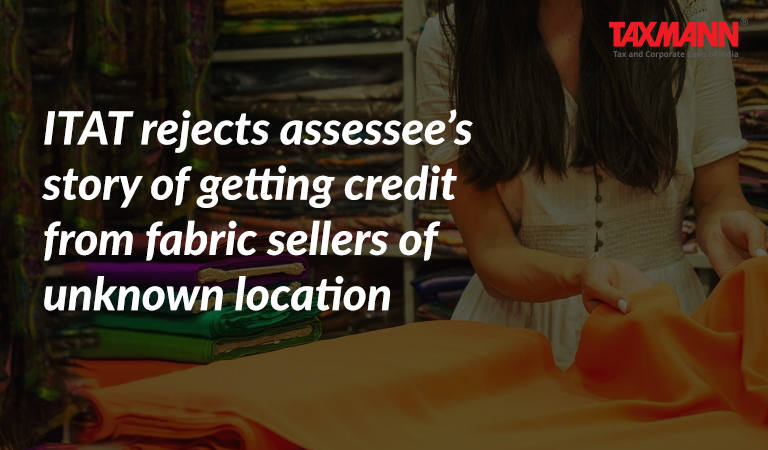ITAT rejects assessee’s story of getting credit from fabric sellers of unknown location
- Blog|News|Income Tax|
- 2 Min Read
- By Taxmann
- |
- Last Updated on 27 October, 2022

Case Details: ITO v. Solid Machinery Co. (P.) Ltd. - [2022] 143 taxmann.com 293 (Mumbai-Trib.)
Judiciary and Counsel Details
-
- Pramod Kumar, Vice-President & Sandeep S. Karhail, Judicial Member
- Samridhi Hande for the Appellant.
- Priyavrat Gupta for the Respondent.
Facts of the Case
Assessee’s case was selected for scrutiny. The Assessing Officer (AO) noticed that assessee purchased fabrics from a large number of entities and sold them to three entities. It was also noted that there was no proof of delivery of fabric as no expenses were debited on account of transportation expenses.
Further, to confirm purchases, notices were issued to four parties and all of them came back unserved with remarks like ‘not known’, ‘not found’ and ‘left’ etc.
The assessee explained that these entities were small parties who primarily work from tables spaces mostly in Bhiwadi and their addresses also keep changing. Further, the good supplied by them was found to be defective and, as per trade practices, the goods were directly picked up by buyers from the vendors. Thus, there was no question of payment for transportation, etc.
However, none of these contentions impressed the AO and he made additions under section 68. The CIT(A) reversed the order of AO. Aggrieved-AO filed the instant appeal before the Mumbai Tribunal.
ITAT Held
The Mumbai Tribunal held that the product that the assessee purchased was fabric, and it does not take complicated analysis to find out whether the fabric was defective or not. The acceptability of the quality of fabric can be examined even at the time of delivery, and, by the way, delivery of the fabric, going by the version of the assessee, was taken directly by the buyer.
If the buyer did not find it defective at the point of taking delivery, it does not sound like a very convincing story that every part of the fabric, bought from each of the dozens of vendors, was found to be defective. That is too much of a coincidence.
If the story of the assessee was to be believed, the assessee bought goods worth almost 20 crores from vendors who do not have fixed addresses, whom the assessee cannot even locate today. Each one of them gave 100% credit to the assessee, 100% of the goods supplied by them were defective, and 100% of the goods purchased from them are said to have been returned in the subsequent year.
On the one hand, the assessee submits that the vendors were so small that they operate from the table spaces on wafer-thin margins. On the other hand, they were so financially strong that neither any payment was made to them by the assessee nor there was any evidence of the goods having actually been returned to them.
Therefore, the credits appearing in the books of the assessee with respect to the purported purchase of goods on credit were not at all reasonably explained. AO was fully justified in making the additions under section 68.
Disclaimer: The content/information published on the website is only for general information of the user and shall not be construed as legal advice. While the Taxmann has exercised reasonable efforts to ensure the veracity of information/content published, Taxmann shall be under no liability in any manner whatsoever for incorrect information, if any.

Taxmann Publications has a dedicated in-house Research & Editorial Team. This team consists of a team of Chartered Accountants, Company Secretaries, and Lawyers. This team works under the guidance and supervision of editor-in-chief Mr Rakesh Bhargava.
The Research and Editorial Team is responsible for developing reliable and accurate content for the readers. The team follows the six-sigma approach to achieve the benchmark of zero error in its publications and research platforms. The team ensures that the following publication guidelines are thoroughly followed while developing the content:
- The statutory material is obtained only from the authorized and reliable sources
- All the latest developments in the judicial and legislative fields are covered
- Prepare the analytical write-ups on current, controversial, and important issues to help the readers to understand the concept and its implications
- Every content published by Taxmann is complete, accurate and lucid
- All evidence-based statements are supported with proper reference to Section, Circular No., Notification No. or citations
- The golden rules of grammar, style and consistency are thoroughly followed
- Font and size that’s easy to read and remain consistent across all imprint and digital publications are applied



 CA | CS | CMA
CA | CS | CMA
